Vancouver prices drop. Toronto down 3.7% from peak, flat for 10 months. Winnipeg plunges most since at least 1990. Quebec City flat for 6 years.
In Greater Vancouver, BC, Canada, house prices fell 0.4% in April from March, the ninth month in a row of month-to-month declines, according to the Teranet-National Bank House Price Index. The index is down 4.7% from the peak in July 2018, the sharpest nine-month decline since July 2009. And it’s down 2.8% from April last year. One of the most splendid housing bubbles in the world is now deflating before our very eyes, after prices had skyrocketed 316% from January 2002 to the peak in July 2018 – meaning prices had more than quadrupled in 16 years:
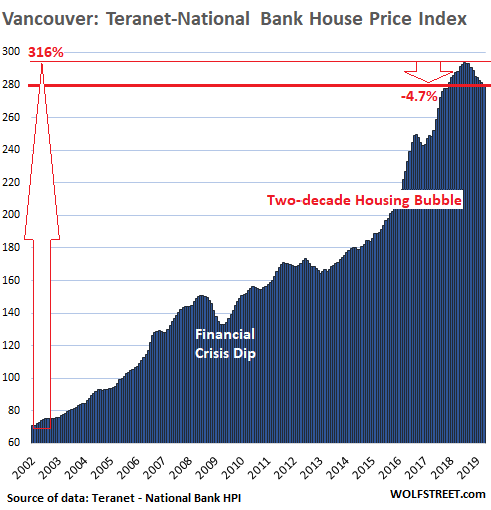
The Teranet-National Bank House Price Index tracks single-family house prices, based on “sales pairs,” comparing the sales price of a house in the current month to the last sale of the same house years earlier (methodology). Using “sales pairs” eliminates the issues that affect median and average price indices but has its own limitations. These median and average house prices, which are much more volatile, are now showing much sharper price declines for Vancouver.
Because the Teranet index uses a similar methodology of “sales pairs” as the S&P CoreLogic Case Shiller index for US housing markets, the indices produce comparable metrics. So let’s compare Vancouver’s housing bubble to the also deflating housing bubble in the San Francisco Bay Area. Splendid v. Splendid. The chart below shows the data of Vancouver (black columns) and San Francisco (red columns), with both indices converted into “percent change from January 2002.”
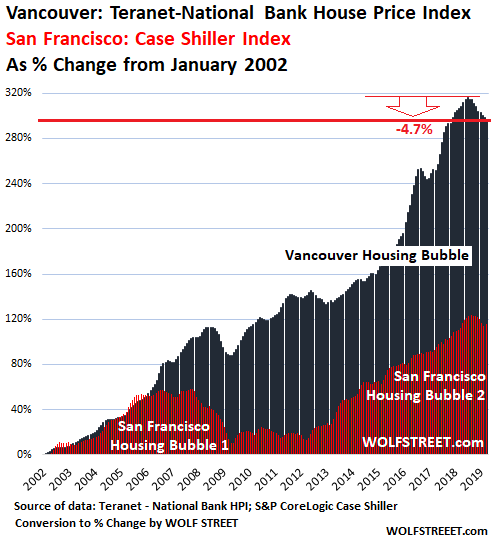
As the chart above shows, Vancouver’s housing market dipped briefly during the Financial Crisis while San Francisco’s market went into a hard four-year downturn, as the US housing bust morphed into the Mortgage Crisis that contributed to the Financial Crisis.
Toronto:
The House Prices Index for the Greater Toronto Area (GTA) ticked up 0.3% in April from March, after three months in a row of declines, but was down 3.7% from the peak in July 2017. Since July 2018, the index has been essentially flat.
From January 2002 through the peak in July 2017, the index skyrocketed 218% — in other words, house prices more than tripled in 16 years, a pale imitation of Vancouver’s house price bubble, where the index had more than quadrupled. The charts are the same scale, so the Toronto chart below has more white space. Note the crazy two-year spike through July 2018, when year-over-year gains maxed out 40%. Just nuts:
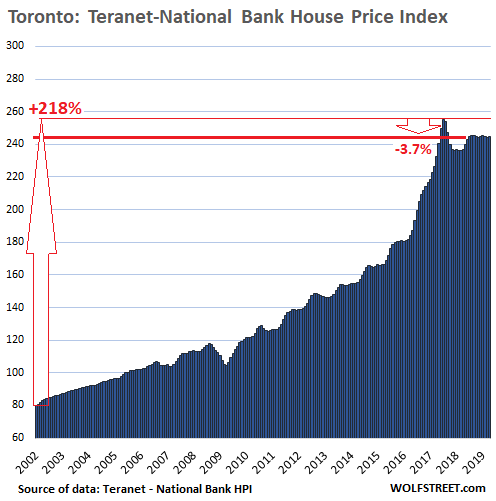
Winnipeg:
The house price index for the Winnipeg metro area dropped a steep 2.0% in April from March, and is down 4.2% from the peak in September 2018, the steepest seven-month decline in the data going back to 1990! The index is now below where it had first been in July 2016. The chart is on the same scale as Vancouver’s chart, so note the white space, in comparison:
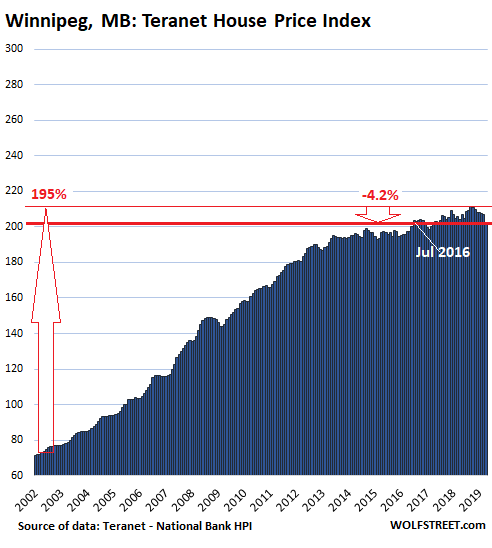
Winnipeg is a perfect example of why housing bubbles are by definition irrational – and no matter how hard you try to rationalize them, they remain irrational. Unlike Vancouver and Toronto, the Winnipeg metro is not huge (population of about 800,000), and there is plenty of land around it. The biggest city nearby is Grand Forks, North Dakota, USA, connected by a straight highway south through beautifully wide-open land.
And yet, the house price index had soared 195% from January 2002 through September 2018 – meaning that prices had nearly tripled in 16 years. Or if you squint a little, you see that the index first nearly reached that level back in November 2014. So, it nearly tripled in those 12 years!
And during the Financial Crisis in the US, Winnipeg’s house prices just hiccuped for a few months before going on their merry way higher. None of the hackneyed rationalizations of housing bubbles apply, and yet, it had a housing bubble.
Montreal:
Home prices in the metropolitan area of Montreal inched down in April from a record in March and are flat for the three-month period, according to the House Price Index. The index is up 159% from January 2002. Even during the Financial Crisis, the index didn’t dip. But this 159% gain in 16 years doesn’t measure up to Vancouver’s crazy housing bubble; and white space is dominating the chart:
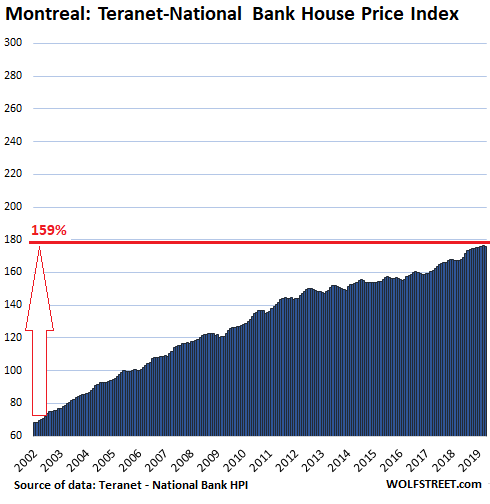
Quebec City:
The house price index for the Quebec City metro ticked down in April from March, continuing its up-and-down game that it has assiduously played since mid-2013, essentially going nowhere for six years, after a blistering 159% increase in the 11+ years from January 2002 through July 2013:
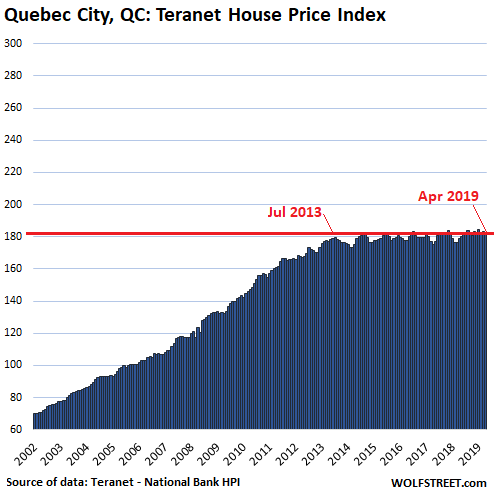
Calgary:
Oil booms and busts dominate the Calgary housing market. When the price of oil surges for years, the housing market booms. When the price of oil enters one of its infamous multi-year plunges, the housing market fizzles. This time around, the price of oil started its collapse in mid-2014, and the House Price Index reacted with a lag of a few months. The index peaked in October 2014, up 140% from January 2002. Then the index followed oil lower.
In April, the index fell another 0.3% from March, is down 7.3% from the peak in October 2014, and is back where it had first been in July 2007, 12 years ago. It remains up 123% from January 2002, a mere fraction of Vancouver’s 316% gain, and white space has taken over the chart:
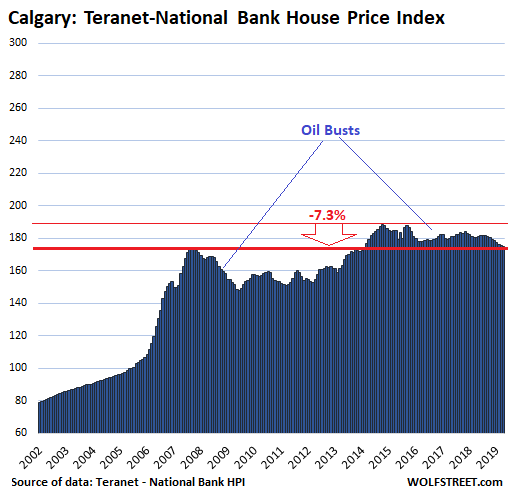
As always with these house price indices that are based on “sales pairs” – whether the Teranet-National Bank House Price Index in Canada or the S&P CoreLogic Case Shiller index in the US: They measure the purchasing power of the dollar in a local market with regards to the same house over time. When the price of a house doubles, the house doesn’t double in size or become twice as opulent (normally, though there are exceptions). What has changed is the purchasing power of the dollar with regards to houses. This turns these indices into a measure of house price inflation, just like other indices are a measure of consumer price inflation. And in some cities in Canada, but not all, house price inflation spiraled completely out of control — and is now reversing bit by bit.
Enjoy reading WOLF STREET and want to support it? You can donate. I appreciate it immensely. Click on the mug to find out how:
![]()


It really brings home the absurdity if it all, to see the San Fran bubble overlaid by the Vancouver bubble.
Simply..Wow!!
At least SF also has the Tech Bubble 2.0. What does Vancouver have? Chinese money launders?
Yes.
Except we need to start using the past tense of “had” rather than “have”.
As Wolf et.al. have repeatedly stressed, “price is set by marginal demand”. That demand from the less-price-sensitive cohort of foreign buyers – like Elvis – has left the building. The building can now collapse.
Well said, there’s a whole cottage industry on Twitter cataloging the insanity of the Van and Tor markets and the shady people/shell companies involved. It’s absolutely fascinating, better dwelling and Steve saretski are great fodder.
Maybe not as much anymore. The BC government is getting VERY vocal about money laundering. Even if they end up not doing anything serious about it, just the fact that they’re incessantly coming up with new revelations and are now clamoring for broader investigations will likely discourage much of the activity. It doesn’t take much to pull the rug out from under such an overinflated market.
Maybe not so ironically, the government casinos were huge launderers of entry point money until they got outed in the media. Make big deposit, wash chips by cashing out majority of chips after a few bets, get casino cheque, deposit in bank no questions asked, done.
Wolf,
Any idea why, if it indeed it is money launderers running up the Vancouver market, they choose to launder in say a 5x over valued market vs a 2x over valued market?
When the bubble collapses, they will have significantly less washed money for all their efforts than if they played in Winnipeg, or some other better valued city.
Ragnar, probably the better way to look at it is that it became 5x overvalued because the rules/regs/enforcement allowed significant money laundering. That “false” demand pumped things up. The ability to clean the money was more important than the return.
RangarD, economies of scale. A $200K house allows you to launder $200K. A million dollar house allows you to launder a million dollars.
Free health care? If you’re a Chinese national, which country is better for an anchor baby?
Anyone who is not ideologically biased would rather live in Canada.
‘Free’ healthcare in Canada costs 500 dollars a month per PERSON in taxes and fees.
Robt:
The number is around $566 a month according to CIHI, to keep this in perspective the USA figure is just under $900 a month according to NHEA. I am pretty sure the insurance companies are the only reason for such a jump.
We Canadians aren’t dumb, the health care in Canada is free from insurance companies gouging people in need. That’s the “free” that matters.
The “free” that matters is whether the doctors, scientists, engineers, nurses, etc etc feel they are getting justly compensated in all ways that matter to them.
People who are smart enough to become doctors are even less dumb than the typical Canadian, and thus the best and brightest won’t allow themselves to be enslaved in an excessively socialist system.
What good is “free” healthcare if it doesn’t buy you anything?
Have you ever been to Vancouver? It’s nice if you like cities, (which I don’t), and the people don’t even sh!% on the streets, imagine that! I can’t imagine why a city person would live there? Sailing, 4 ski hills within 20 minutes, Hockey. :-)
No YVR is not Silly Valley, but it is a mining headquarters centre, forestry, and the main Canadian port for imports and exports. Lots going on and more work than workers.
qt
LOL! Both produce lots of (slick, soapy) “bubbles”……..LOL!
The Chinese money laundering, and some whispers it is a very large number has been washed at Casinos etc. The number is OVER $8.9 BILLION – CAD – and that is probably small. Real Estate went insane. Fentanyl sales and other crooked money has destroyed any sense of sanity, in Vancouver Real Estate. The average Canadian now has a debt to asset radio of $1.78 to $1.00….and HELOCS are about to eat a lot of people alive. The saddest part, is the loss of jobs, so kids are staying at home into their thirties….Mom and Dad want to sell their overpriced shack – but they have borrowed so much on a HELOC, the interest rates bump, even a bit, the house isn’t worth a couple of million anymore – curtains. Only 2 Canadian Provinces make it legal to ‘walk away’ from a Mortgage, if you go Bankrupt. People in Vancouver, British Columbia and 8 other Provinces face RUIN…and still have to pay off the mortgage. *It’s really 2 French words combined MORT = DEATH – GAGE = PLEDGE. It is going to be a disaster.
Up 316%? now down by ?? Don’t worry be happy.
Toronto’s got to be one of the more volatile house markets around. From mid-January to mid-May the averages are up 200,000 about 25% and the median is up 120,000, about 19%.
From October ’18 to Jan the averages were down 125,000 or 15% and the median was down 76,000, 11%.
YOY averages May to May up 60,000 and median up about 68,000, both about 6.6 and 8% respectively.
It really is a roller-coaster most years. Get ready for the summer slump.
Toronto also has the most active construction cranes in N. America and the highest number of skyscrapers under construction.
Yes, more units under construction when prices are already far too high to justify in terms of fundamentals.
It’s a good recipe for…
I’d really like to know where all the money is coming from to buy units in these things. We don’t make anything anymore, and all the factories have been either converted into condos or leveled to make side by side skyscraper condos everywhere selling for 1000 dollars a foot.
Just sold my home 1 hour south of Toronto and had to laugh when my agent got a text from a 25 year experienced agent warning all the kids in the business….”The trend is changing, no more of the days of listing anything HIGH….in this market price to sell or lose out.”
I’m glad I out and will sit on sidelines for a few years and watch the show about to start….
1 hour *south* of Toronto? Where in Rochester NY are you living?
Down 4% in a few months….but up 200% in ten years. Honestly, it’s a nothingburger.
Yes, everything starts with a nothingburger.
Ha-Ha! And then the “nothingburger” becomes a supersized “Whopperburger”LOL!
Yes, up 200% with no underlying fundamental justification.
Rejoice! It surely is different this time.
About another 15 years of price drops to go to regain fair value – just like Japan 30 years ago.
Same rampant speculation, same complicit governments, same fiscal policies, same loose lending – same result.
Buckle up!
They can earn thousands percents. But to lose they always have not more then 100%
The human foible of not grasping reciprocals.
Up 100% is the same thing as down 50%, because the denominator is flipped.
Same problem with Mark-up vs. Margin.
Where’s socaljim to quell us all with his anecdotes that he’s “seeing” on the ground?
Selling oranges by the freeway since real estate is slow right now.
Small point when comparing Toronto to Vancouver – I can’t speak for the entire spectrum of the market, but I work in tech, and salaries have gone up substantially in Vancouver over the past decade (just based on headhunters calling me). That’s much less the case in Toronto, where I’m billing out at the same rate (or in some cases slightly less) per hour than I was ten years ago (not just me, I’ve checked with co-workers). Housing affordability in Toronto might have actually declined at a faster pace than in Vancouver over that period as a result.
The current housing bubbles are not as correlated with “fundamentals” as they are with irrational exuberant mindless speculation and money laundering.
Compared to the Bay Area or Seattle Vancouver is such a lousy job market. RE in Vancouver is being sustained by shady Chinese trying to get out of dodge. Enough said.
With open borders in Canada the population is far greater than the numbers say. Plus legal migration which was not even touched upon in the article for some strange reason.
No “strange reason.” This was an article about house price indices and not immigration.
Population density doesn’t prevent the bursting of real estate bubbles, regardless of how much wishful thinking needs to clutch at that particular straw.
Have a look at Tokyo’s population density, then have a look at their RE market post-1990. Not pretty.
That’s what you’re facing.
Always remember that Canada adds one percent to its population every year from immigration. That is about 325,000 people a year coming to Canada that need a place to live. (like the USA adding 3.25 million immigrants a year).
Most immigrants head to Toronto Vancouver Calgary or Montreal, hence the pricing. They come into saturated market but need a place to live, so prices are pushed up. There is also a big push to increase density (not sprawl) so land fro development is scarce (and rightly so as most development is paving over our best farmland, which is then lost forever).
Halving immigration levels would really help bring house prices down.
That is why our NDP Govt in ’72? put in the BC Agriculture Land Reserve (freeze on developing farm land). If your land is in the Reserve it is worth just 50% of residential. Maybe less. If you fly over BC it’s simply all mountains for the bottom 1/2 where most of the people live. Agriculture only happens in the valleys. That is one main reason why land costs are so high.
As for money laundering, the BC Govt announced today an unrestricted public enquiry and laws are already being changed to shut it down as much as possible. However, it goes on everywhere and always has.
Nothing whatsoever to do with immigration – just a classic, manic real estate bubble based on loose lending and foreign speculative (and often criminal) money.
Did you ever consider how many Canadians leave Canada every year? Then do some simple subtraction, go ahead, it’s not that hard. Or just check out stats Canada and look up the countries population growth rate. It’s 1.2%!
I was surprised at the Winnipeg stats. I used to work north of Winnipeg and cannot even imagine living there. Windy and freezing in the winter…killing cold. Buggy beyond belief in the summer. Flooding. Lots of native gang activity. I am tentatively planning a bit of an eastern route vacation and may not go just to avoid southern Manitoba. Great people, but as flat as the Salt Lake desert. If I could only levitate my Westie at Lethbridge and land in Kenora, game on. But…..
Surely, then, Winnipeg is next on the list of bubble cities. Because everybody has to put every last penny into real estate. Right?
And it never goes down, regardless of how ridiculously overpriced the real estate is compared to everything else. Right?
Winnipeg is as high as it is going to get. The main player in that city is the Richardson family and the products the family businesses are covering have all been taking a beating from the oil slump, the freight slow down and the grain tariff spat.
Winnipeg will only climb if the money laundering wants to go that far inland.
The oil market is controlled by the exact same crooks who rig Wall Street and rig the gold and silver market. This means $100 oil will be centuries away in the future.
The Chinese Investment in Canada is being taxed now. So the money is going to the U.S. where if you and I brought loads of cash to escrow, we would be questioned by the FBI. The Chinese do this and no questions on the source of the money. They also apply for the EB-5 Visa, which gives them residency for a 500k “investment”. From there it’s anchor babies, Put the kids in UC Irvine, buy more rental property, etc. The Chinese Govt is doing what it can to stop the cash flow out, but the Elite in China can convert their money to Digital Currency and use other methods including offshore. I don’t expect Chinese money to leave U.S. real estate, just transfer from Canada.
The US bubble bust is 6 months away…the west coast is already a mess. Just wait until the Everything Bubble Pops….2008 will look like a walk in the park.
Housing costs have been fundamentally wrong since 2002 when interest rates cut to prevent economic slowdown after 9-11. As well emerging middle class as a result of the world shipping jobs to China created wealth for many there but they choose to move their money rather than risk losing. Now many have treated homes as atm to subsidize low wage growth. Banks, governments and the top 10% allowed it to happen since it was a benefit to them. Prices may have quadrupled but will they realistically devalue even 50% to balance the class inequity….I doubt it.
Not That it matters, but BC government is calling a public inquiry into how money laundering has corroded the provincial economy, inflated B.C.’s housing market and contributed to the ongoing deadly opioid crisis.
As always, Wolf charts & graphs awesome. I have been in SW US res real estate for 15 years (mostly AZ). Vancouver/Toronto feels like San Fran ala 2008+. Our NV, AZ, TX, FLA So Cal (the sand states) fell in that same bucket in ’08….whereas Winnipeg et al (Canuck “sand states?”) surge upward but stay flat for years. Seems like just a stable high market to me, which will stay level and probably climb slowly again. Vanc/Tor will crash – but I predict it will take 3 years and only about 25% to the bottom.
Russian money laundering in Canada and the U.S. is as rampant as the Chinese version. These are real crime syndicates we are talking about. Google “Dmitry Klyuev Canada”.
Also google “Russian birth-tourism services Florida”. Many of these are people who stay in 45’s properties.
The Russians don’t turn cities, towns and countries into ghost cities, ghost towns and ghost countries. The Russians are businessmen whereas the Chinese live to create endless ponzi’s.
Did you notice in all of the statistics that were presented in this article, nothing was mentioned about the curve that money laundering can throw into those numbers. Why is it the people are the only ones questioning the impact that money laundering has had on the housing figures and activity. Very hard to decipher a trend with all of that underhanded stuff happening. I find the article not at all realistic as a result.
The article discusses price movements, not the causes of those price movements.
Every article has its own specific topic. If you want to read our articles on money laundering in Canada, and the impact of money laundering on RE, you can just go ahead and read them, including our most recent ones:
https://wolfstreet.com/2019/05/10/money-laundering-provided-1-in-20-dollars-for-real-estate-in-b-c-canada/
https://wolfstreet.com/2019/04/24/how-a-little-money-laundering-can-have-a-big-impact-on-real-estate-prices/
must be new here.